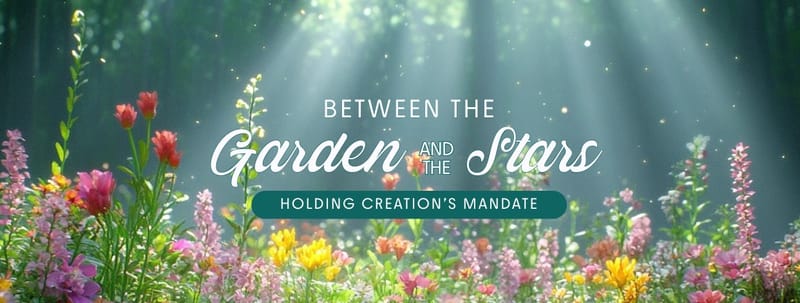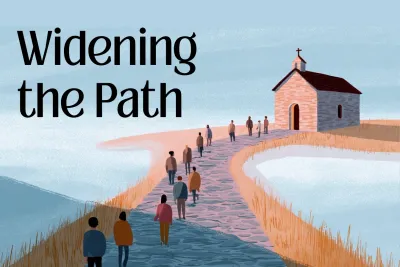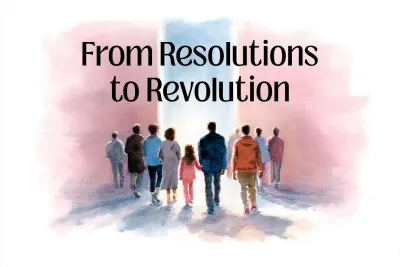In my last reflection, I explored the echo of desire from Eden to our present doorstep, calling us to heed the warning of unexamined want, borrowing Daniel Lanois’ lyric—"the fault of the sailor, the fault of he who asks no questions, about the cargo he is carrying”. Yet as we consider the challenge of purpose—the call to “dress and keep the garden” even as we “be fruitful and multiply”—another perspective insists on center stage: not only what we’re called to do, but how, and on what foundation.
The Garden of Eden was a showcase of God’s perfect handiwork. But far from leaving us untethered, our Maker embedded two unshakable pillars to orient every effort: His Word, and the heavens themselves. The Book of Genesis frames this dual foundation with precision: “And God said, Let there be lights in the vault of the sky... to govern the day and the night, and let them be for signs and seasons, and for days and years.” The greater and lesser lights were not merely celestial decoration, but authoritative signals—reminders of a reality that both roots and
beckons us.
The lesson—threaded throughout People of the Sign, Hardness of the Heart, and Rod of Iron—is as unsettling as it is clear: losing sight of God’s Word, or rebelling against the order He has woven into creation, is a recipe for disaster. The tower of Babel crystallizes this truth. In pursuing human unity and “progress” apart from divine revelation, we built not bridges but confusion, sowing the seeds of division and fragmentation that ripple through history and our own lives. God’s intervention at Babel was not arbitrary; it was corrective—a refusal to let us
chart a course by our own desires, untethered from revelation.
This remains the perennial temptation. In our era, suffused with technology and ambition, we are forever lured to reach for the stars on our own terms, all the while risking the loss of grounding in the “signs and seasons” God provided as compass points. The imperative to grow—to “be fruitful and multiply”—was never a license to spurn the stewardship of “dressing and keeping” the garden. Likewise, aspiration must never eclipse submission to the pattern and precepts revealed in Scripture and in the heavens.
There is an ancient wisdom which keeps both feet planted in sacred soil. Micah 6:8 captures it without flourish: "He has shown you, O mortal, what is good. And what does the Lord require of you? To act justly and to love mercy and to walk humbly with your God."
Here is the heart of the garden’s charge, the antidote to Babel’s overreach. Justice, mercy, and humility—these are not abstract ideals, but the bedrock orientation that allows us to cultivate and create, to hold fast to the Word and look rightly to the stars. As I look back upon my own journey—through broken systems, through shifts of faith and failures of heart—one core lesson emerges: aspirations that are not rooted in the will and revelation of God are castles in sand. The greater and lesser lights above us illuminate both the path and the boundaries; submission to them is not enslavement, but liberation, ensuring that our creative callings—personal, communal, or even cosmic—are marked by fidelity, not hubris.
In the pages of my trilogy, I have often returned to the idea that our exile from Eden was not simply a punishment, but the beginning of our apprenticeship: a necessary loss that sent us on a journey to learn how to bring heaven to earth—to “do greater works,” as Christ said (John 14:12). The Kingdom of God on earth is not merely about personal redemption, but the flowering of a world in which the lessons of the garden and the challenge of the cosmos harmonize.
Is this not our ultimate destiny? To stand, humble but unbowed, at the intersection of stewardship and aspiration, tending what is while preparing for what could be? We are meant—by divine intent, if we dare believe it—not only to restore Eden within and around us, but to labor with God toward a universe so rich with meaning, beauty, and life that even the stars themselves will bear witness.
May we, in our time, choose rightly: Rooted in revelation, stewarding what is, aspiring to what could be—guided by the lights above and the truth within. When we do, even our longing for heaven on earth finds its answer, not in the confusion of Babel, but in the faithfulness of those who walk humbly with their God. The true Kingdom of God on Earth is not built by our straining, but by His Spirit, as we walk justly, love mercy, and bow undivided to His Word.
—Wade Fransson






